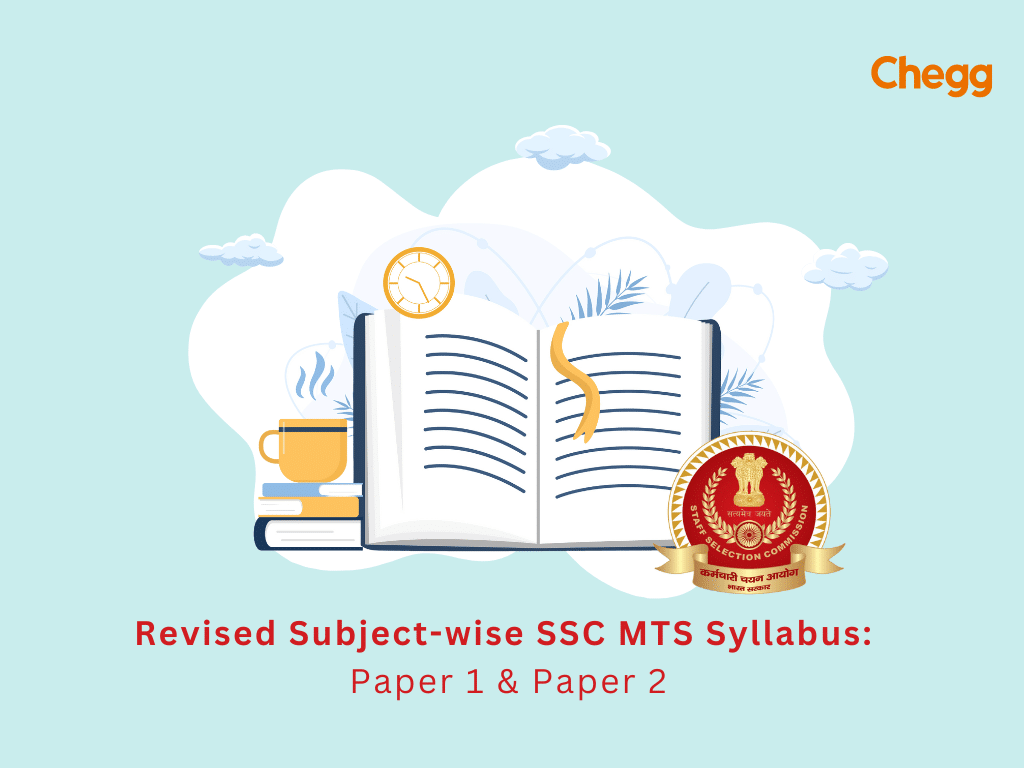
A thorough understanding of the SSC MTS syllabus is essential for candidates aiming to prepare effectively and meet the requirements of both roles. The SSC MTS (Multi-Tasking Staff) examination is a widely recognized recruitment test conducted by the Staff Selection Commission to appoint candidates to Group C non-gazetted roles across various central government departments. In addition to MTS posts, the exam also facilitates the recruitment of Havaldars in CBIC and CBN, where candidates are assessed on both written and physical criteria.
The selection process comprises a single stage, Computer-Based Examination (CBE), which evaluates candidates across four key subjects:
Each section is designed to assess foundational skills appropriate for candidates with a minimum qualification of Class 10. Familiarity with the revised syllabus is essential for strategic and effective preparation. Candidates are advised to review the subject-wise SSC MTS syllabus, topic breakdown, and exam pattern provided below.

To clearly understand the SSC MTS 2025 Syllabus, it’s important to first go through the exam pattern. Below, we have shared the detailed SSC MTS Exam Pattern and Syllabus. Candidates preparing for the exam should review the complete details carefully and plan their preparation accordingly.
| Organisation | Staff Selection Commission (SSC) |
|---|---|
| Exam Name | SSC MTS 2025 |
| No. of Questions | 90 |
| Max. Marks | 270 |
| Negative Marking | Session 1 – No negative marking Session 2 – 1 mark deduction |
| Official Website | www.ssc.gov.in |
The updated SSC MTS Paper-I Exam Pattern was earlier released along with the official SSC MTS Notification and is detailed in the table below.
The Computer-Based Test will be held in two sessions: Session-I and Session-II, both of which are mandatory. Failure to attempt either session will lead to disqualification.
There will be no negative marking in Session-I, but in Session-II, 1 mark will be deducted for each incorrect answer.
| Subject | No. of Questions | Marks | Duration |
|---|---|---|---|
| Session 1 | 45 minutes | ||
| Numerical and Mathematical Ability | 20 | 60 | |
| Reasoning Ability and Problem-Solving | 20 | 60 | |
| Total (Session 1) | 40 | 120 | |
| Session 2 | 45 minutes | ||
| General Awareness | 25 | 75 | |
| English Language and Comprehension | 25 | 75 | |
| Total (Session 2) | 50 | 150 |
The SSC MTS Physical Efficiency Test (PET) and Physical Standard Test (PST) are crucial for candidates applying for the Havaldar post, as they assess physical fitness and key attributes like height, chest expansion, and weight. These tests ensure that candidates are physically capable of handling the demands of the role, thereby maintaining operational readiness and safety. Clearing the PET and PST is essential to move forward in the selection process, making it important for candidates to prepare thoroughly and meet the required physical standards.
Physical Efficiency Test
| Activity | Male | Female |
|---|---|---|
| Walking | 1600 meters in 15 minutes | 1 km in 20 minutes |
Physical Standard Test
| Gender | Height | Chest / Weight |
|---|---|---|
| Male | 157.5 cms (relaxable by 5 cms for Garhwalis, Assamese, Gorkhas, and ST) | 81 cms (fully expanded) with a minimum expansion of 5 cms |
| Female | 152 cms (relaxable by 2.5 cms for Garhwalis, Assamese, Gorkhas, and ST) | 48 kg (relaxable by 2 kg for Garhwalis, Assamese, Gorkhas, and ST) |
The SSC MTS Syllabus 2025 for Paper I includes topics from Numerical Aptitude, Reasoning Ability & Problem Solving, English Language, and General Awareness.
The Numerical Ability section of the SSC MTS Computer-Based Test (CBT) includes a total of 20 questions carrying 60 marks. This segment is designed to assess basic mathematical skills relevant to candidates with a 10th-grade qualification. To prepare effectively, candidates should focus on the key topics outlined in the syllabus, which are structured to test fundamental arithmetic and analytical abilities.
| SSC MTS Mathematics Syllabus |
|---|
| Integers and Whole Numbers |
| LCM and HCF |
| Decimals and Fractions |
| Fundamental Arithmetic Operations |
| BODMAS |
| Percentage |
| Ratio and Proportions |
| Work and Time |
| Simple Interest |
| Profit and Loss |
| Distance and Time |
| Graphs and Data |
The Reasoning and Problem Solving Ability section of the SSC MTS exam will consist of 20 questions, carrying a total of 60 marks. Candidates should focus on the key topics listed below, as they form the core of this subject’s syllabus.
| Reasoning Ability & Problem Solving Topics |
|---|
| Alpha-Numeric Series |
| Coding and Decoding |
| Analogy |
| Following Directions |
| Calendar and Clock |
| Similarities and Differences |
| Jumbling |
| Problem Solving and Analysis |
| Nonverbal Reasoning (based on diagrams, Age Calculations, Calendar and Clock, etc.) |
The English Language and Comprehension section will be featured in Paper 2 of the SSC MTS Computer-Based Test (CBT). This section will consist of 25 questions, carrying a total of 75 marks. To prepare effectively, candidates should focus on the key topics outlined in the English syllabus for the SSC MTS examination.
| English Language & Comprehension Topics |
|---|
| Spot the Error |
| Fill in the Blanks |
| Synonyms |
| Antonyms |
| Spelling/Detecting Mis-spelt Words |
| Idioms and Phrases |
| One Word Substitution |
| Improvement of Sentences |
| Comprehension Passage |
The General Awareness section of the SSC MTS exam consists of 25 questions, carrying a total of 75 marks. To perform well in this segment, candidates must stay informed about current events and possess a solid understanding of static general knowledge. The syllabus includes a mix of historical, constitutional, cultural, and economic topics, making it essential for aspirants to prepare across multiple domains.
| General Awareness |
|---|
| History |
| Geography |
| Culture |
| Indian Constitution |
| Sports |
| Current Affairs |
| Economics |

Recommended Reads:
Ans. The basic pay for SSC MTS is Rs. 18,000, with a starting salary of Rs. 18,000 to Rs. 22,000, monthly.
Ans. The SSC MTS exam syllabus for being considered for jobs consists of four sections. This includes Reasoning Ability, Numerical Aptitude, English Language, and General Awareness.
Ans. Paper 2 is a qualifying paper that only tests a candidate’s basic skills. There will be a maximum score of 50 for it.
Ans. Paper I is divided into two sessions. In session 2, each incorrect response will receive one point of negative marking, whereas in session 1, there will be no negative marking.
Ans. To crack the SSC MTS exam in 2 months. You must prepare a two-month study approach and schedule for each day, keep yourself updated on everything around the world, attempt mock tests daily, and study current affairs and static GK regularly. Make sure you are well acquainted with the exam’s syllabus and pattern.

Authored by, Nidhi Kukreja
Exam Prep Advisor
Nidhi is a passionate writer who specializes in long-form, research-backed content that delivers real value. Whether she’s writing blog articles or creating educational modules, she focuses on making complex topics clear, detailed, and easy to understand. Her content is designed to build knowledge and credibility, helping readers gain deeper insights with every piece.
Editor's Recommendations
Chegg India does not ask for money to offer any opportunity with the company. We request you to be vigilant before sharing your personal and financial information with any third party. Beware of fraudulent activities claiming affiliation with our company and promising monetary rewards or benefits. Chegg India shall not be responsible for any losses resulting from such activities.
Chegg India does not ask for money to offer any opportunity with the company. We request you to be vigilant before sharing your personal and financial information with any third party. Beware of fraudulent activities claiming affiliation with our company and promising monetary rewards or benefits. Chegg India shall not be responsible for any losses resulting from such activities.